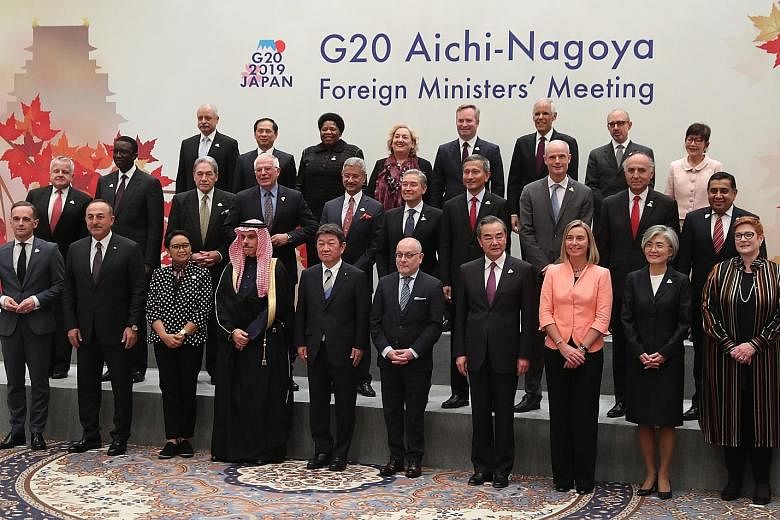The leaders of Japan and South Korea will sit down next month for their first formal talks in more than a year, as Seoul's decision to salvage a bilateral military intelligence pact from the brink lends momentum for a return to dialogue.
Japanese Prime Minister Shinzo Abe and South Korean President Moon Jae-in are set to meet next month in Chengdu, on the sidelines of a trilateral summit also involving Chinese Premier Li Keqiang.
It would be the first summit between Mr Abe and Mr Moon since September last year when they met in New York.
Mr Abe gave Mr Moon the cold shoulder on several occasions this year - not least the Group of 20 (G-20) leaders' summit in Osaka in June - although Mr Moon initiated a brief 11-minute chat via interpreters this month in Bangkok.
But the two countries are still poles apart on a web of intractable issues from wartime labour to trade, with neither showing any discernible shift in their positions beyond the latest face-saving attempt to buy time.
What this means is that South Korea's extension of the General Security of Military Information Agreement (GSOMIA), which it described as "conditional", could just be a stay of execution.
"We bought time for intense discussions, but there's not much time left for us," said South Korean Foreign Minister Kang Kyung-wha, after meeting her Japanese counterpart Toshimitsu Motegi on the sidelines of the G-20 Foreign Ministers' meeting in Nagoya yesterday.
Their joint security ally, the United States, has said that jettisoning GSOMIA will only play into the hands of a nuclear-armed North Korea and an assertive China.
South Korea had said in August it would allow GSOMIA, a hard-won pact that entered into force in 2016, to lapse. Without it, Tokyo and Seoul would be able to share sensitive military intelligence only via Washington as an intermediary.
-
Vivian stresses need to support global governance structures
-
SINGAPORE • Singapore Foreign Minister Vivian Balakrishnan attended the Group of 20 (G-20) Foreign Ministers' Meeting in Nagoya, Japan, where he stressed the need to support global governance structures, particularly the World Trade Organisation (WTO).
He also highlighted efforts by countries, including Singapore, to establish rules in new areas like e-commerce, which is a key growth pillar for world trade.
A statement from Singapore's Ministry of Foreign Affairs (MFA) yesterday said Dr Balakrishnan highlighted Singapore's strong support for the United Nations' 2030 Agenda on Sustainable Development, which comprises 17 Sustainable Development Goals (SDGs).
"He also shared Singapore's capacity building efforts under the Singapore Cooperation Programme to help other developing countries achieve the SDGs," said the MFA.
At the G-20 meeting, the foreign ministers discussed the importance of upholding an open and rules-based multilateral trading system as embodied by the WTO.
The foreign ministers also supported continued efforts towards the realisation of the UN 2030 Agenda and emphasised efforts to assist Africa in its development.
The pact would have ceased at midnight on Friday if not for the 11th-hour U-turn, which media reports said was due to US pressure.
Bilateral ties have been spiralling out of control since a South Korean Supreme Court decision in October last year ordering Japanese firms to compensate wartime labours.
Japan, which wants an end to "apology diplomacy", says all reparations have been paid out under a 1965 bilateral pact to normalise ties and that the decision violates international law. But Seoul says the 1965 agreement does not stop individuals from seeking redress.
Mr Motegi warned Ms Kang yesterday that bilateral ties will be in an "even more difficult state" if the seized assets of Japanese companies in South Korea are liquidated.
In addition, Japan in July slapped stricter export regulations on sensitive material to South Korea before removing it from a white list of trusted trading partners a month later, alleging mishandling of items with war potential.
Seoul sees this as unjust political retaliation and lodged a complaint with the World Trade Organisation. Seoul said on Friday it had dropped the complaint as both countries agree to trade dialogue.
Business and tourism ties have been hurt amid rising antipathy in South Korea towards Japan. The number of South Korean visitors to Japan plunged 65.5 per cent last month, compared with last year, while Japanese exports to South Korea fell 23.1 per cent.
Japanese newspaper editorials said it was too premature to be sanguine, given the issues at stake.
The Yomiuri Shimbun said it remains to be seen if trust can be restored, adding that "an optimistic view should be avoided".
The Mainichi Shimbun, which described Seoul's U-turn as "intended to mollify Washington", called for calm. It said: "Emotional conflicts that heighten local tensions must be averted."
Mr Mintaro Oba, a former US diplomat who worked on Korean peninsula issues, wrote on Twitter: "It's a fig leaf that reflects the fact that Korea and Japan haven't really resolved anything, but want to avoid fully antagonising the United States at a sensitive moment."

